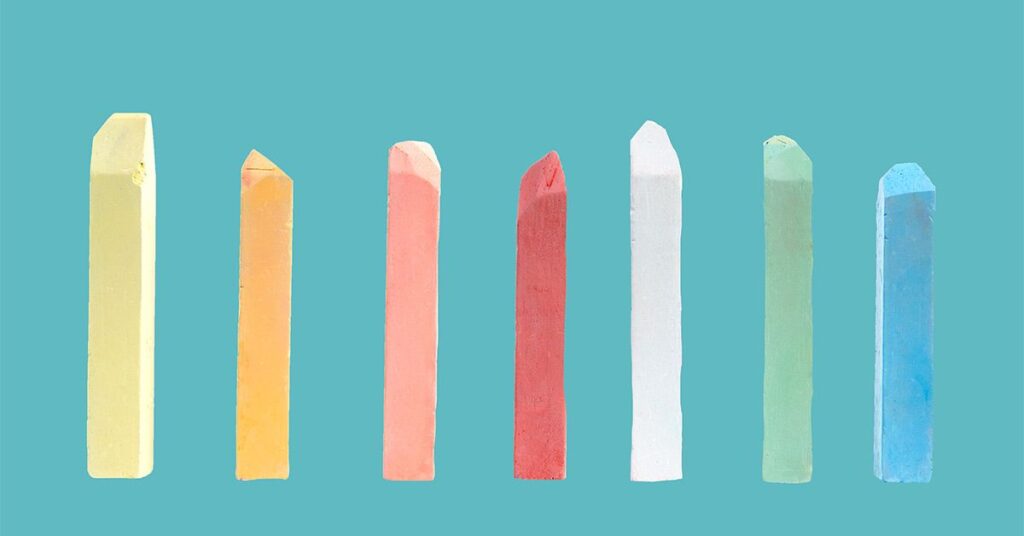Chalk isn’t exactly something most adults consider a delicacy. From time to time though, some adults (and many children) might find themselves craving chalk.
If you feel the compulsion to eat chalk regularly, you might have a medical condition called pica. Over time, pica can result in digestive complications.
Here is more information if you have questions about eating chalk.
Pica is the desire to eat non-foodstuffs, or materials that aren’t meant for human consumption.
People with pica want to (and often do) eat raw starch, dirt, ice, or chalk, among other things. Pica is considered a type of eating disorder, and it is also linked to obsessive-compulsive behaviors, malnutrition, and pregnancy.
A 2015 review of studies involving over 6,000 individuals with pica symptoms linked the condition to low red blood cell count as well as lower levels of zinc in the blood.
The types of nutritional deficiencies that would cause a person to crave chalk, specifically, aren’t completely clear, but researchers have long theorized that eating chalk is connected to having low zinc and low iron.
People experiencing food insecurity or hunger pain may find themselves drawn to eating chalk. While your brain knows chalk isn’t food, your body can see chalk as a solution to a hunger pang or a nutritional deficit, signaling a desire or “craving” for it.
Anecdotally, some individuals who have anxiety or OCD report that the consistency and taste of chalk make it soothing to chew on. In recent years, the ASMR trend has led to more younger people chewing on and eating chalk.
If a child under the age of 2 has a habit of eating chalk and other non-foodstuffs, it’s not considered unusual or atypical for that developmental stage. Doctors don’t usually diagnose pica in children who are less than 24 months old.
Pica is diagnosed first by a series of questions. The doctor will try to determine how long someone has been eating chalk, how often they have the urge to do it, and whether it’s related to any other factor that puts people at higher risk for wanting to eat chalk, such as pregnancy or OCD.
If it appears that a pattern of eating chalk is present, your doctor may conduct a blood test to check for lead poisoning, anemia, and other conditions that have been linked to pica. If someone has been eating dirt, a stool sample may also be requested to check for parasites.
While chalk is minimally toxic, not poisonous in small amounts, and may not hurt you, it’s never a good idea to eat chalk.
A pattern of eating chalk is a different story, however. Eating chalk often can disrupt your digestive system and cause damage to your internal organs.
risks of eating chalk
Complications of eating chalk consistently may include:
tooth damage or cavitiesdigestive difficulties constipation or obstructions in the bowelslead poisoning parasitesdifficulty eating typical foodsloss of appetite
If you’re pregnant or nursing, eating chalk may negatively impact fetal development since:
the craving to eat chalk could indicate an imbalance in your nutrition that needs to be correctedeating chalk could mean you lack the appetite for other food that will actually nourish and replenish your body, which is already working overtime
The treatment plan for eating chalk depends on the underlying cause.
If a blood test reveals a nutritional deficiency, your doctor will prescribe supplements. In some case studies, supplements that correct a nutritional deficiency are enough treatment to put an end to the behavior and the craving.
If eating chalk is related to another condition, such as obsessive-compulsive disorder, prescription medication and appointments with a therapist might be recommended.
When to see your doctor
You don’t need to see a doctor if you or your child have eaten one small piece of chalk. You do need to speak to a doctor if craving chalk, or eating chalk, is becoming a pattern. Call your doctor if you or a loved one eats chalk more than once or twice, or if eating chalk becomes a repeated pattern of behavior.
Eating chalk can trigger other health conditions in your body. The content of the chalk by itself is not necessarily the problem, but it’s not meant to be digested regularly by the human digestive system.
Treatment for eating chalk is fairly straightforward, and the medical literature predicts a high rate of success for treatment.
Eating chalk is a symptom of an eating disorder called pica. Pica is associated with pregnancy and nutritional deficiencies, as well as obsessive-compulsive disorder.
Speak to your doctor if you’re concerned that you or a loved one have developed a habit of eating chalk.

